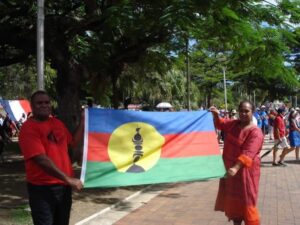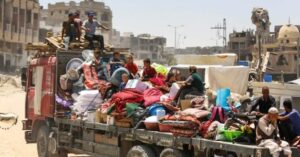
Civil Society, Democracy, Editors’ Choice, Featured, Freedom of Expression, Global, Headlines, Human Rights, Press Freedom, Sustainable Development Goals, TerraViva United Nations

Irene Khan, Special Rapporteur for freedom of expression and opinion, briefs reporters at UN Headquarters. Credit: Manuel Elías/UN
– Rights groups have called for governments to do more to combat transnational repression as a series of recent reports show growing numbers of exiled journalists, political dissidents and rights defenders are being targeted by autocratic regimes in an attempt to silence them.
They say governments must do more to deal with the repression, which takes the form of online harassment, surveillance, enforced disappearances, physical attacks and sometimes even killings, to protect the safety of these people.
“We have seen an increase in transnational repression, tied into the rise in authoritarianism around the world in general. Generally, there is a growing awareness of this complex problem among host countries and a willingness to do something about it.
“But more work needs to be done in some areas and governments need to support exiled journalists and understand the vital importance of the work they do,” Fiona O’Brien, UK Bureau Director at Reporters Without Borders (RSF), told IPS.
The scale of the problem has been laid bare in a number of reports in recent months.
In February, rights group Freedom House released a report documenting scores of attacks, including assassinations, abductions and assaults, carried out by governments against people outside their borders in 2023.
Naming Russia, Cambodia, Myanmar, Turkmenistan and China as the biggest perpetrators, it also reported on the first known cases of transitional repression sanctioned by a number of governments, including the regimes of Cuba, the Democratic Republic of the Congo, El Salvador, Myanmar, Sierra Leone and Yemen.
The group said that 44 countries—more than a fifth of the world’s national governments—have attempted to silence dissidents, activists, political opponents and members of ethnic or religious minorities beyond their own borders in the last ten years, with 1,034 recorded direct, physical incidents of transnational repression.
Meanwhile, at the end of June, while presenting a report on transnational repression, the United Nations special rapporteur on freedom of opinion and expression, Irene Khan, raised concerns not just about increasing incidents of transnational repression, but host countries’ responses to it.
“Too often, states are either unwilling for political reasons or unable for lack of capacity or resources to protect and support journalists in exile. Journalists should not be treated as political pawns but as human beings in distress who, at great cost to themselves, are contributing to the realization of our human right to information,” Khan said.
Following the report, scores of governments issued a joint statement condemning the repression and committing to coordinated action to help people being targeted and to hold accountable those behind any attacks. But it did not spell out any specific measures that should be implemented to do this.
Rights groups say that concrete steps must be taken by host governments to address the problem both in their own countries, and to confront those regimes perpetrating such acts.
Phil Lynch, Executive Director at the non-profit organisation International Service for Human Rights, said such action should involve host states not only providing comprehensive protection and support to those at risk of acts of transnational repression, but also measures, to undermine the capabilities of regimes to target people abroad.
He said host states must ensure they do not support or acquiesce in acts of transnational repression, such as through extradition or refoulement to states engaged in the persecution of human rights defenders; do not provide or export the tools or technologies of transnational repression, such as spyware and arms, to repressive states; must build awareness and law enforcement capabilities to respond to acts of transnational repression; and publicly denounce, investigate and pursue accountability for acts of transnational repression, including through sanctions and diplomatic repercussions.
“They should also prioritise human rights in foreign policy and relations both at bilateral and multilateral levels, adopting a principled and consistent approach to human rights in all situations, without selectivity and without discrimination,” he told IPS.
The lack of any serious consequences for regimes using transnational repression is helping perpetuate its widescale use, experts say.
“Governments don’t seem to be shying away from using transnational repression. This is likely because there has been very little accountability even in the most well-publicized cases, like the assassination of [Saudi dissident writer] Jamal Khashoggi. Since governments aren’t paying a price for targeting dissidents abroad, there’s little reason for them not to attempt it,” Yana Gorokhovskaia, Research Director, Strategy and Design, at Freedom House, told IPS.
But it is not just host country governments that could do more, experts say.
“Most of the harassment and attacks are online. Big tech have been totally absent from [efforts to fight transnational repression]. Governments have to hold big tech to account on this,” said O’Brien.
“Increasingly, acts of transnational repression occur online or are technology-facilitated. Technology providers have a duty to conduct due diligence to ensure their technologies and tools are not used, directly or indirectly, to restrict or violate human rights, including through acts of transnational repression. Governments should also legislate to mandate that human rights due diligence is undertaken by companies,” added Lynch.
It appears that some countries are becoming increasingly aware of the issue and willing to improve how they tackle it.
O’Brien said this following an RSF report on harassment of Iranian journalists in the UK released earlier this year. British authorities have “shown a lot of interest in how to tackle this problem better,” while Freedom House has highlighted how President Joe Biden’s administration has made addressing the issue a priority across law enforcement and security agencies.
Gorokhovskaia also pointed out that over the last four years various countries have adopted policies to mitigate the threat posed by transnational repression, including improved training for police and security agencies and more outreach to communities that can be targeted.
“Countries have also become more aware of how international organizations, like Interpol, can be misused for transnational repression and taken steps to address this (by examining Interpol notices from certain perpetrator countries),” she said.
But research from other groups shows a much less reassuring picture.
A report from Human Rights Watch (HRW) said some host country governments were not only failing to ensure adequate protective measures for those at risk but were even actively facilitating transnational repression.
UN special rapporteur Khan also warned of host states becoming enablers “of transnational repression, for instance, by colluding in abductions instigated by the home state.”
Some alleged cases of such facilitation involve ostensibly stable, democratic, western states.
Abdulrahman Al-Khalidi, a political activist and a known dissident, arrived in Bulgaria in October 2021.
A campaigner for human rights and advocate for democratic reforms, he had fled his home country in the wake of mass arrests following the Arab Spring.
But since crossing into Bulgaria and claiming asylum, he has faced a complicated and, he says, at times incomprehensible legal battle over authorities’ continued refusal to grant him asylum and release him from detention at the migration centre despite court rulings in his favour.
He is facing deportation to Saudi Arabia, where, he told IPS, he will almost certainly be killed.
Al-Khalidi believes the Saudi secret service is behind the Bulgarian authorities’ blocking of his asylum. He says that during questioning by agency officials, he was told they were working with Saudi authorities on his case and that Saudi officials wanted him returned to Saudi Arabia. The Bulgarian state security agency has repeatedly said Al-Khalidi is a threat to national security, thereby blocking his asylum and release from detention.
Speaking to IPS in early July as he began a hunger strike while at a migrant detention centre near the Bulgarian capital, Sofia, where he has been held for the last three years, Al-Khalidi had a warning for governments hosting exiled dissidents and journalists.
“We live in a time full of international turmoil in which younger generations believe in anarchism more than they believe in democratic principles. This is very dangerous. The blame for this is fully borne by politicians who benefit from this and whose actions contradict the principles of the state, subsequently raising generations who lose their faith in both,” he said.
IPS UN Bureau Report






















